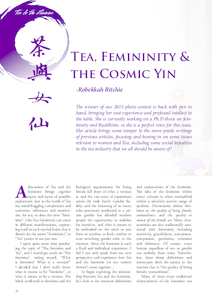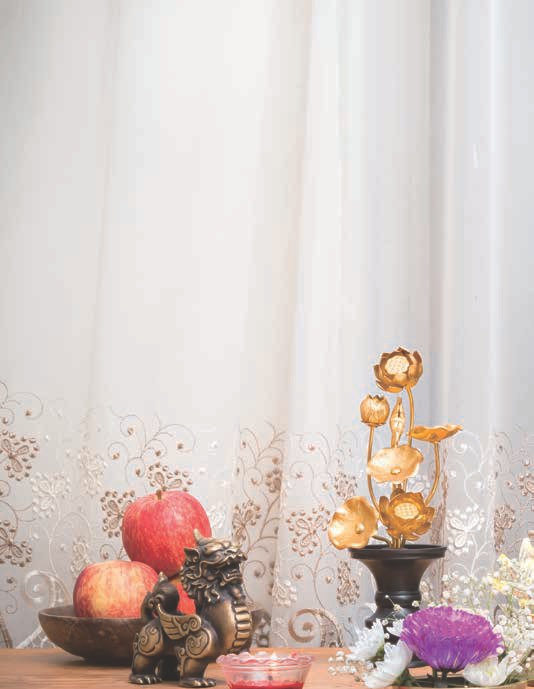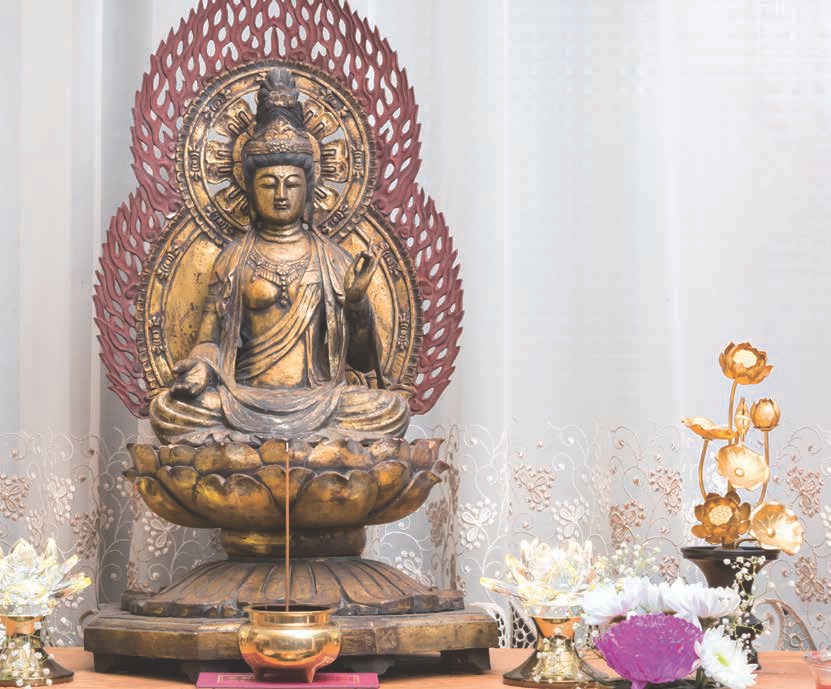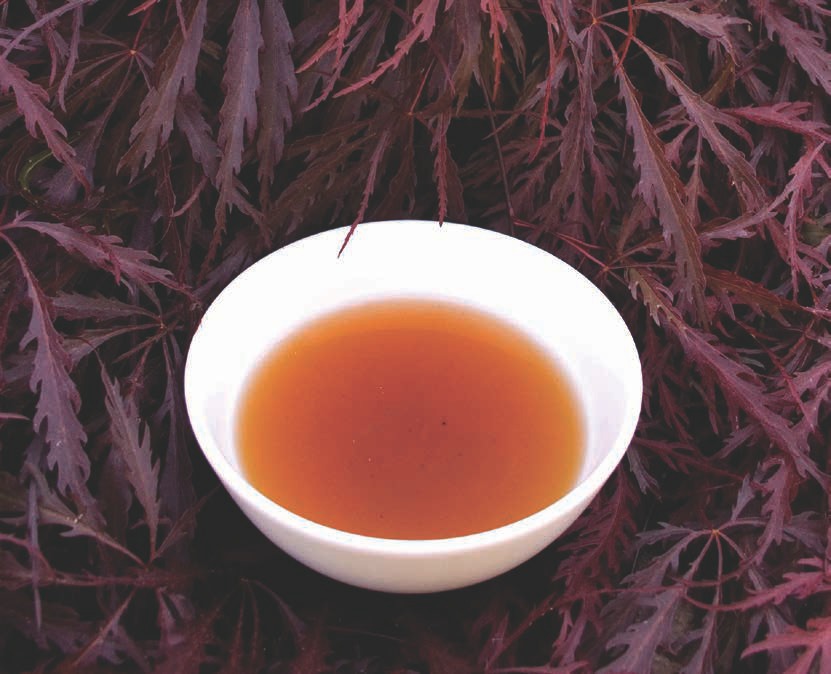
 |
|

A discussion of Tea and the feminine brings together layers and layers of possible exploration. Just as the world of Tea has mind-boggling complexities and variations, influences and sensitivities, for me, so does the term "feminine". Like Tea, femininity can come in different manifestations, expressing itself in such myriad forms that it doesn't do the terms "Femininity" or "Tea" justice to use just one.
I spent quite some time pondering the topic of "The feminine and Tea", and I would get stuck on "The feminine", asking myself, "What is feminine? What is a woman?" I decided that I don't really know what it means to be "feminine", or what it means to be a woman. The labels attributed to feminine and the biological requirements for being female fall short of what a woman is, and the vast array of expressions across the wide Earth. Gender fluidity and the loosening of so many roles previously attributed to a certain gender has afforded modern people the opportunity to redefine for ourselves, and what it means to be embodied on the earth in one form or another, or both, neither or even switching gender roles to the moment. Since the feminine is such a fluid and individual experience, I feel I can only speak from my own perspective and experience how Tea and the feminine (or my version thereof ) come together...

To begin exploring the relationship between Tea and the feminine, let's look at the common definitions and explanations of the feminine. The idea of the feminine within many cultures is often exemplified within a relatively narrow range of qualities. Dictionaries define feminine as: the quality of being female; womanliness; and the quality or nature of the female sex. Many characteristics are also traditionally associated with femininity including sensitivity, gracefulness, nurturance, compassion, gentleness, tolerance and deference. Of course, every human regardless of sex or gender can embody these traits. Nonetheless, these linear definitions and stereotypes don't do justice to the vastness that is "the quality of being female; womanliness".
Many of these more traditional characteristics of the feminine can be seen throughout the Tea world - in the gracefulness of ceremonies and the softness of the liquor, the sweetness of the aroma or when we feel nurtured by Mother Nature with warmth and gentleness. Imagining the beauty of the elegant leaf dancing in hot water, the steam curling and delicate, evokes an effeminate sentiment.
However we choose to embody/explore the feminine (regardless of the body we currently experience), it sits within the dualistic framework contrasting with the Masculine. These aspects are just different sides of the same coin, since our consciousness (or whatever you would like to call our non-material "self/being") is genderless and without socially constructed qualities. Being within, or experiencing a particular side of this metaphorical coin can take on various qualities, expressed in a diverse range of traditions - as Yin/Yang, Shiva/Shakti, Sun/Moon, etc. One side can only be whole and balanced when partnered with its "opposing" quality, in a complementary dualism. An oversimplification of the Taoist version is expressed through tai chi with Yin, the cosmic feminine, having characteristics of dark, cold and damp; and Yang, as the cosmic male, with the opposing bright, hot and dry qualities. These cooperative sides create the natural world, the seasons and weather, etc., and neither side is independent, or better than the other. In the Indian context (again oversimplified) Shiva, the masculine, symbolizes consciousness, the passive, transcendent, unmoving eternal principle. This is seen in a sense as having no movement or "life" within it without the feminine, symbolized by Shakti. Shakti is activation, movement, energy or life force that moves creation. Again Tea embodies these two sides perfectly through the meeting of stillness (silence/dry tea leaves) and energy (movement/water, heat). And when they come together, something new is created.
As our discussion on complementary dualism continues, I would
like to briefly discuss the "darker"
side of the feminine. As previously
explored, the stereotypical expressions of the feminine come in a
clean, white, pure capsule embodying grace, beauty, tenderness and
delicacy. These ideals of the feminine have been deeply ingrained
through the ages with the demonization of women who were deeply
connected with their power and the
Earth, whether through the tens
(some say hundreds) of thousands
of women killed as witches, or the
"savage" women found on newly
colonized continents around the
world. Much social stigma still exists
around women's bodies - especially
when topics of menstruation, abortion and childbearing (including
breastfeeding) are discussed. These
topics seem to disrupt the cleanliness and purity that women are
always meant to embody. The "dark"
side of the feminine is not dark
in the sense of bad or evil, but the
dark mysterious void from which
life arises. A chapter of the Dao De Ching poetically explores this idea:
The Valley Spirit never dies.
It is named the Mysterious Female.
And the doorway of the Mysterious Female
Is the base from which Heaven and Earth sprang.
It is there within us all the while.
Draw upon it as you will,
It never runs dry."
To continue our brief dash through the idea of the darker embodiments of the feminine, we return again to Hindu mythology, and this time, to the Goddess Kali, who is one of the embodiments of Shakti we discussed earlier. Kali is the Goddess of power, change, time and destruction and is quite literally dark: with her black skin, symbolizing her all-embracing and transcendental nature: "Just as all colors disappear in black, so all names and forms disappear in her" (Mahanirvana Tantra). Interestingly enough, for me, this perfectly describes much of my experience when drinking dark, earthy, living tea. Kali is bloody, fierce and unapologetic, and quite the opposite of what most of our social constructs consider feminine. My interest in discussing these various aspects of the feminine isn't to claim one superior to the other, but to explore and embrace the multitude of ways it can be expressed. Just as Tea, She can come as light, uplifting and Heavenly, or dark, viscous and rooted in the Earth.
There are interesting threads woven between Tea and the feminine, and another that I find resonance with is the idea of invisibility. Tea is the second most consumed beverage in the world, and in many ways it is quite invisible through the commonality of it. In the UK, 60.2 billions cups of tea are consumed in a year, and in the US, Americans consumed over 80 billion (in 2014), which is still nothing in comparison to China or Turkey. When something is so common, it can become invisible, taken for granted and undervalued, for example, simple leaves - just water and heat, like a mother healing her family though providing daily nourishment through her food. When our medicine is what we consume everyday, it would seem to someone outside peering into our lives that we don't consume any kind of (what the western world considers) medicine. Just as the medicine women in native cultures were invisible to the European settlers because all of the women were medicine women. Women of color are also particulary subject to invisibility within our Euro-centric cultures and ideals of beauty and worth. Undervaluing the lives of women and our Earth, however, has not only traumatizing effects on those directly involved, but on us all collectively as well.
The aspect of invisibility in the feminine contributes to much of the exploitation of the Earth, women and children around the world. There are no words for the marginalization, exploitation and violence that women have experienced in our current and past world. The same can be said to what has occurred to our Mother Earth when we consider the pillaging and poisoning that happens everyday. Because of this invisibility, it can be easy to ignore. The majority of Tea is picked by women and children, many lacking basic needs. Due to the incredibly low wages of tea pickers in India for example (around 1$ a day), many young women are coerced with promises of a better life by traffickers, who often sell them as maids or into prostitution rings. Stories of sexual abuse, forced labor, lack of access to education, healthcare and horrific living standards abound when looking into many larger tea producers. Exploitation and abuse of women and children on tea farms has been documented in India, Bangladesh, Nepal, Sri Lanka, Indonesia, Brazil and a number of African countries (Kenya, Malawi, Rwanda, Tanzania, Uganda, Cameroon and Zimbabwe). Forced labor is also reported in China, claiming that a quarter of China's tea is produced by Laogai penal camps. The number of tons yielded by the top three tea producers in the world is boggling: China with around 1,980,000 tons, India with 1,184,800 tons, and Kenya producing 445,105 tons in 2014. Combining these quantities with the vastness of the countries tea is produced in; it paints a bleak picture of the number of people suffering in such unacceptable conditions. And this isn't accounting for the contribution of the heavy use of toxic chemicals in pesticides, herbicides and chemical fertilizers on the workers' health. Some light has been shed on the toxicity of pesticides in tea due to it being heralded as one of the latest health trends in the West, and now concern is spreading about what some are consuming. These chemicals directly affect the lives of everyone involved directly with tea plantations, and their families. Though there are countless dire stories, there are also many individuals, communities and organizations committed to a more ethical and sustainable Tea production, like Global Tea Hut, of course.

Once we begin to have a deeper relationship to our Earth, what Tea means as medicine and to our fellow humans, these invisible aspects that cause so much harm and destruction are brought to the surface. In a sense, we can't heal wounds that we don't know exist. Changing our perspectives to see what we consume - our food, water and tea as medicine - brings respect back to our Mother Earth, and those who share this planet with us. When we begin to truly honor what is so often marginalized (whether it be through greed, ignorance, our capitalist/consumerist/patriarchal societies, etc.) we can begin to heal some of the damage and move into a more sustainable future.
One of the ways I find further honors Tea and the women in my life is to bring the two together in women's tea circles. This has the benefit of not only sharing space and Tea as medicine but can also work as a platform to further discuss our relationship with Mother Earth and the necessity for ethical sustainability. Our societies are made of communities, which are made of families, which are made of individuals. Even on the micro level, my relationship to Tea, water, Earth as a whole, and others I come in contact with is the foundation of where we can grow healthy and whole families, communities and societies. I am often reminded to never underestimate the power we have to influence others simply by living our own truth. It seems for me so natural and so simple to serve tea, and yet many have profound experiences through it, reminding me to not underestimate this seemingly simple act and the medicine that Mother Nature offers us. Connecting through Tea is without dogma, expectation or judgment, allowing a safe space for authentic expression which is usually rare for many living in such an opinion/expectation-driven world. To be able to support others in this way is such an incredible gift, especially when participants describe their experience: "What I particulary remember is the enormous gratitude and the deep universal trust, which I experienced more and more with each bowl of tea." A deep bow of gratitude to all those serving, receiving and living the multifaceted expression of the feminine.
